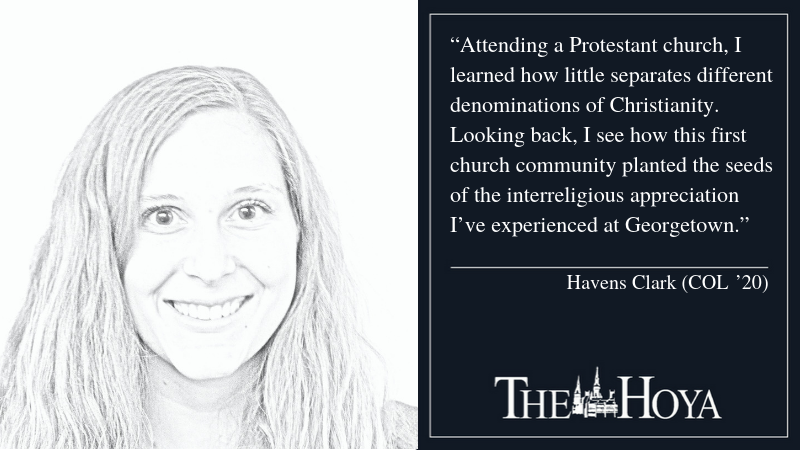Unlike many Catholics, I was not forced into a suit and tie or printed dress and sweater every Sunday morning. I didn’t spend my early elementary years dreaming of my first Communion veil or worrying about confessing I had pulled my sister’s hair again.
My mother rarely drove her three daughters to Mass. As a recently divorced woman, she felt unwelcome in a room of Catholics whom she imagined would silently judge her for receiving Communion and criticize her decisions as a parent.
Rather than Catholic Mass, my family often attended services at the Methodist church down the street. It was at that small community church where my sisters and I first experienced a faith community. As we bounded up to the altar to listen to Christ’s gospel with other young children, we understood the love and forgiveness of Jesus Christ.
My mother found healing there, too. Her time away from the Catholic Church gave her time to internalize Christ’s love and understand that her divorce was a choice made for her family — for her daughters — that she should not be ashamed of.
In fact, my years spent away from Mass ultimately led to my kind and trusting relationship with God. Attending service at the Methodist church allowed me to experience my faith in a different way. The service was Bible-focused, fueling my creative mind with images of Jesus serving the poor and sharing meals with outsiders in his community. Growing up with these messages, I understood my faith as a way to bring people of different backgrounds together. I felt a deep conviction to love others, regardless of class, health or religion — just as Jesus loved them. Ultimately, I hoped to live a life of service to others.
Attending a Protestant church, I learned how little separates different denominations of Christianity. Looking back, I see how this first church community planted the seeds of the interreligious appreciation I’ve experienced at Georgetown.
Still, as I grew older, I wished to learn more about the Catholic Church. Spending time with my grandfather on weekends, my soul stirred as I listened to him murmur his daily rosary. The soft words of praise, devotion and love escaped his lips, floating to my ears with the rhythm of music.
Studying my Bible alone at night, I experienced comfort in those disciples who became saints. If even Saint Peter, who denied Jesus three times, could be loved by God, maybe my daily transgressions and mistakes were forgivable too. When Lent began, I excitedly decided to give up sweets, proud to do this small act for Jesus — even though I didn’t really understand why I was doing it.
When it was time to decide on a high school, I chose a Catholic school. Ready to commit fully to the Catholic faith, I received my first Communion at the age of 15. Contrary to Catholics, Methodists do not believe in the real presence of Jesus’ body and blood in the Eucharist. While a typical Catholic may see the sacrament of Confirmation as a permanent commitment to the church, my time away from Catholicism led to my understanding of communion as the avowal of my faith. In partaking in the body and blood of Christ, I made a commitment in my heart to God and to the Catholic Church.
Walking up to the altar, surrounded by elementary schoolers — most Catholics receive their first Communion as small children — I couldn’t help but think of listening to the gospel at the Methodist church. Those Methodist services laid the groundwork for my relationship with God, preparing me for my first Communion, where I was like a child experiencing faith in a new way. I no longer felt indignation for my mother’s alienation from the church. For as I looked out at her in the pews, I realized she had fallen away from God during her marriage and afterward. My mother watched the church welcome her daughter, despite receiving her first Communion eight years late; in that moment, she realized it wasn’t too late for her to come back either.
My faith is stronger now than if my closet had been filled with Sunday Mass dresses growing up. Because of my years attending the Methodist church down the street, I learned the value and importance of interdenominational and interreligious dialogue. Because I didn’t grow up with the rosary, my encounter with it at age 13 was refreshing and transformative. Because my mother experienced alienation from the church, I strive to always profess my faith with an open heart and welcoming spirit.
Havens Clark is a junior in the College. Into the Feminine Genius appears online every other Wednesday.














